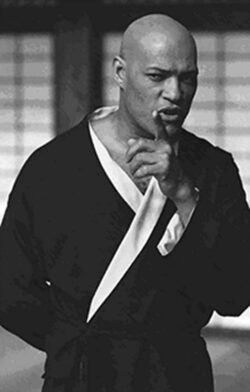The Straightjacket of Delusion is a funny thing. You only notice it when it’s pointed out to you, AND you are open to looking.
What’s Your Problem, Man?
This topic is described in my book, Half Asleep in the Buddha Hall. You can read more about it here

Psst!! Hey!!!
** Want more great writing designed to help YOU to shift your behaviour?
** Want to learn how to find, build or deepen your principal relationship?
** Want to know more about Zen living and being?
Check out Wayne’s books! (amazon link)
Or, check them out right on our site.

One of the main plot points in the movie series “The Matrix” is that what people are seeing is an illusion. — and this is a key tenet in Buddhism.
In the Matrix, the illusion is done on a grand scale — humans are food, are confined to cylinders, and are drugged into thinking they are actually living in an apparently “real,” yet totally fabricated universe.
Morpheus, the guru to protagonist Neo, is sort of a guide cum mentor cum martial arts trainer. A human Yoda, as it were.
He offers Neo a choice:
Morpheus: This is your last chance. After this, there is no turning back. You take the blue pill — the story ends, you wake up in your bed, and believe whatever you want to believe. You take the red pill — you stay in Wonderland, and I show you how deep the rabbit-hole goes.
And believe me, that rabbit hole is deeper than is easily imaginable
Morpheus: Let me tell you why you’re here. You’re here because you know something. What you know you can’t explain, but you feel it. You’ve felt it your entire life, that there’s something wrong with the world. You don’t know what it is, but it’s there, like a splinter in your mind, driving you mad. It is this feeling that has brought you to me. Do you know what I’m talking about?
Much of what I’ve written, and the way I attempt (and often fail) to live my life has to do with escaping the straight-jacket of delusion. The delusion comes in many flavours, and has everything to do with thinking. Analyzing. Judging.
And, emphatically, it has to do with escaping how we act. You know, things like looking outside of yourself for success, happiness, fulfillment, and approval. Or even more problematic: looking outside of yourself for rescue.
The truth of the matter is that all of us have been fed a line about what the world is about — about how the world works. This imaginary dream-world was described in the Story of Indra’s Net, millennia ago. (I write about this story in my book, Half Asleep in the Buddha Hall.)
Morpheus: Have you ever had a dream, Neo, that you were so sure was real? What if you were unable to wake from that dream? How would you know the difference between the dream world and the real world?
“Blue pill reality” = the story society teaches you — has been, and continues to be, handed to you on a platter.
It’s the fantasy that the world is (for everyone but you) wired to provide for your every desire, that others are supposed to do what you want them to, and that life is supposed to be (or make you) happy.

The kind of happiness being sold is of the materialistic sort. It’s dependent happiness — if I have the right job, take the right course, have the right parents/spouse/kids, if I make the right amount of money, and live in the right town, in the right size house, then I’ll be happy.
Except that, even as some or all of those fantasies come true, all that happens is that happiness recedes, as new “demands on the universe” occur to you.
Along with the “happiness is everything” mantra comes its partner — grasping.
Because the stuff you want seems fleeting, you cling to what you have. Because some other stuff seems “yucky,” you endlessly push it away, yet find yourself endlessly pushing.
And the biggest grasping of all is the belief that the way you think the world is, has anything to do with how the world is.
At the same time, there’s that little voice, whispering that something about your picture of the world isn’t quite right. Yet, when a solution(such as meditation,) is offered, that’s when the excuses come out.
People are quite content to stay stuck in the Matrix, desperately doing what they can to ignore the pain of knowing something’s amiss.
That’s the splinter in the mind part of the above quote.
It’s the niggling, poking, irritating “knowing” that something about this picture is haywire — that something about what we’ve built out there, the way we live, the way we relate, the way we make a living, that all of it is somehow “half a bubble off plumb.”
In the middle of the 19th century, the existentialist philosopher Kierkegaard first described this splinter as Angst. More than anxiety, Angst is a deep seated and profound despair and insecurity. In a sense, the baubles and allures of modern life are sold to us as a distraction from this Angst-driven splinter of suspicion.
The path we suggest is finding your freedom. It is not freedom from. It is, symbolically, popping the red pill.
I tend to frame this from a Zen perspective. I do this because I am continually amazed at the insights of The Buddha, so many centuries ago, as he saw through the illusion and delusion of living life from a perspective of dualism. He identified the essence of life — clear, unencumbered, liberated understanding.
He freed himself from the paralysis of analysis, stopped over-thinking, and began to live.
He saw through the delusions that surrounded him, dropped the endless search for happiness, and found Nirvana (peace.)
It was not Siddhartha’s aim to be happy. His path does not ultimately lead to happiness. Instead it is a direct route to freedom from suffering, freedom from delusion and confusion. Thus Nirvana is neither happiness nor unhappiness–it goes beyond such dualistic concepts. Nirvana is peace.
What Makes You Not a Buddhist, pg. 87?
Here’s a hint: if this splinter analogy makes sense to you, if you “get” that something is wrong with the traditional picture of who you are and how the world works, then — wait for it — you must step out, completely, from the faulty picture, and embrace another way.
Half measures do not work.
Dabbling at meditation, trying a communication model, experimenting with Qi Gong, testing out a therapy — all are ways to stay deeply caught in the Matrix, while lying to yourself that you are actually accomplishing something.
Half measures do not work, and are actually a part of staying deeply stuck.
But, but…
But nothing. The splinter feeling is there, for all of us, because the common, “blue pill” version of the world simply does not hold. The cosmos is not a celestial candy store, just filled with goodies for you to “manifest.” It’s not up to others to do what you want them to. It’s not about who you know, where you work, or even what you create — if you think any of that stuff will last, dream on, dream on.
The only way out is 100% commitment to removing the straight-jacket of delusion by taking 100% responsibility for yourself, and 0% responsibility for correcting, directing, or demanding anything of another.
Morpheus: Neo, sooner or later you’re going to realize just as I did that there’s a difference between knowing the path and walking the path.
So, what’s really the point of it all? Coming into full self-awareness, which in a sense means seeing through the games. It’s accepting that you are the creator of every iota of your reality, and you do so by and through your judgements, attractions, and aversions.
Once you see that the world you have is the one you are making, you can ease up, drop the judgements and interpretations, and open yourself to the path of simply and fully being.
What I mean is, you begin to immerse yourself in the experience of living your life, with full attention, absolute dedication, and no investment in outcome.
Can this be done? Of course. Moment by moment. It looks like active attentiveness, without desire for life, situations, people, or “what’s happening” to be any different than it is.
This is not surrender or not caring. Because of this focus, you may tirelessly invest your time and energy into anything. But you will do so from a full commitment perspective, not from “Somebody should do something about this!”
Here’s how it appears:
When observed from an ordinary point of view, enlightened beings may seem insane because they don’t negotiate, they cannot be lured or swayed by material gain, they don’t get bored, they don’t look for thrills, they have no face to lose, they do not conform to rules of etiquette, they never employ hypocrisy or personal gain, they never do things to impress people, and they don’t display their talents and powers just for the sake of it.
But if it benefits others, these saints will do anything necessary…
What Makes You Not a Buddhist, p 104
This is life lived without games, illusion, or restriction.
It’s living life full bore, experiencing it all, not holding back, blocking yourself, depriving yourself of experience for propriety’s sake.
It’s a commitment to move heaven and earth so that others might awaken too, but without getting your ego involved in whether others choose to join you or not. (This would be one I deal with all the time, sometimes elegantly, sometimes not so much.)
If this kind of living, this kind of freedom appeals to you, stay tuned! I’ll be talking about the practicalities of this in the weeks to come.





